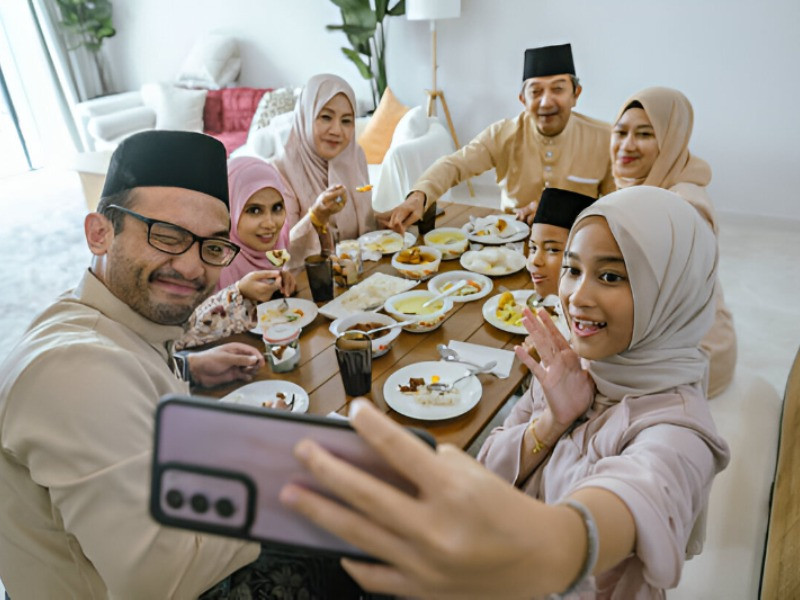Eid al-Fitr advertising in Indonesia has traditionally been synonymous with emotional warmth, family reunions, and a celebration of generosity. However, a closer semiotic analysis of recent ads shows a shift towards more grounded narratives, reflecting authentic societal experiences, including the complexities surrounding “mudik” (homecoming) and Eid gatherings.
Methodology and Scope of Analysis
This article is based on a semiotic analysis of 32 Indonesian Eid advertisements from 2025, spanning both television and digital platforms. The analysis involved decoding visual symbols, narratives, language, and themes, providing insights into deeper cultural meanings and shifts in societal conversations.
The Dominant Themes: Togetherness, Generosity, Forgiveness, and Nostalgia
Historically, brand leveraged Eid to reinforce idyllic images of togetherness, generosity, forgiveness, and nostalgia. Ads typically depicted joyful reunions, happy feasts, and idealised family moments, capturing the aspirational nature of Eid. In 2025, however, marketers seem more attuend to consumers’ real-life experiences, highlighting no just festive happiness but also the challenges and societal proessures surrounding the celebrations.
Yet, traditional themes of generosity and nostalgia still hold significant cultural power. Ads like Promag’s 'Mungkin Maag' effectively bridge traditional generosity with realistic portrayals. The protagonist’s physical discomfort underscores how personal wellbeing impacts one’s ability to engage in acts of kindness, thus presenting a grounded, relatable scenario rather than an idealised one.
Similarly, nostalgic elements remain effective but have become intertwined with authenticity. Ads from Nissin Wafers and Kisspray leverage sensory nostalgia—taste and scent—to evoke memories, not just for sentimental reasons but as powerful emotional anchors connecting consumers to their heritage.
The Emerging Themes: Mudik Challenges, Social Pressures, and Gendered Expectations
One of the most significant emerging codes in Indonesian Eid ads is “mudik” – the ritual of returning to one’s hometown. Traditionally depcited as joyful reunions full of anticipation and excitement, recent narratives show a marked shift. For example, , the Easycash advertisement starkly contrasts traditional portrayals of joyous reunions by emphasising financial struggles that hinder families from undertaking the mudik journey. Here, emotional longing is entangled with economic hardship, reflecting a nuanced reality that many Indonesians face.
Similarly, Tiket.com and Wondr advertisements portray logistical stresses of mudik, capturing anxieties around forgotten bookings and last-minute panic. Popmie further enhances this realistic portrayal by highlighting the discomfort and annoyances of prolonged travel. Such narratives do not negate the value of family reunions but provide a relatable acknowledgment of the physical and emotional toll that comes with fulfilling cultural expectations.
Moreover, ads have started to capture the subtle yet potent social anxieties experienced during Eid gatherings. Ultra Milk’s campaign creatively dramatizes young adults' discomfort, depicting how family meetings can quickly turn into arenas of personal scrutiny. Questions about careers, marital status, or personal achievements become moments of dread, humorously eased by clever product placement that promises sharper wit and quick comebacks.
Indofood takes a different turn by highlighting gendered expectations around Eid preparations. The ad acknowledges the invisible labour often shouldered by women, from meal preparation to household management. These tasks come loaded with social expectations and judgment, subtly critiqued in Indofood's nuanced depiction.
Understanding the Shift: Why It Matters
Such shift towards acknowledigng Eid’s less idyllic realities reflect broader societal changes. Younger generations in Indonesia, shaped by digital discourse and increased openness, resonate more with ads that reflect their lived experiences rather than idealised fantasies. Brands that understand and navigate this cultural evolution effectively connect on a deeper emotional level.
This evolution suggests a deeper cultural shift in how Indonesians perceive and experience Eid. Brands are progressively reflecting an authentic narrative of modern Indonesian life – acknowledging complexities while still honouring core cultural values. The 2025 Eid ads offer not merely festive imagery but meaningfull connections to their audience’s grounded realities.
The lesson is clear: meaningful storytelling goes beyond surface-level celebrations. By integrating authenticity with traditional symbolism, brands create more impactful and memorable connections with Indonesian consumers. Eid ads in 2025 are not just stories of joyful reunions; they are reflections of real journeys, societal pressures, and genuine emotional connections.
Want deeper cultural insights for your brand? Reach out to us to elevate your next campaign!


